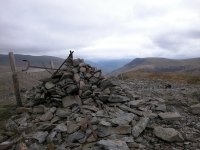 |
A Back O' Skiddaw walk (30th April 2005)A first visit to the fells "Back o' Skiddaw" during the Mayday weekend of 2005.. |
Sketch map will appear here
The hills rising north of Keswick and the river Greta form a
close-knit
group entirely separated from the rest of the district. These hills,
the
subject of Wainwright's Northern Fells book, divide down naturally into
three subsections - the Skiddaw and Blencathra massifs to the southwest and southeast, and the Caldbeck fells to the north.
Skiddaw and Blencathra both have a high profile - they dominate all
views to the north from just about every fell in the Lakes, they are
poular and fascinating and well frequented. The Caldbeck fells,
however, stand apart in all these respects. Known officially as the
Skiddaw Forest and colloquially as "back o' Skiddaw", the Caldbeck
fells are remote and lonely and relatively barren of scenic highlights.
These are bare, rolling hills cloaked in rough grasses and heather.
There are few paths and few rock features.
Wainwright's guides catalogue nine fells in this area, which I've
extended to include a tenth, Binsey, which stands on its own at the
northwestern edge of the district. The parent fell is Knott, a
sprawling hill of 2329 ft. Surrounding Knott are Great Calva to the
south, Carrock Fell and High Pike to the northeast, and Great Sca Fell
and its neighbours to the northwest, a group that includes the earthily
named Great Cockup. Carrock Fell is arguably the finest hill of the
group, the only one posessed of a decent share of scenery on its
slopes, while the most accessible is High Pike, standing immediately
south of Caldbeck village. The attraction of these fells lays in their
remoteness and their wide open spaces - here one can wander at will,
for mile upon mile, often without seeing another soul. Pick a fine day
and its charms will be revealed.
 |
A Back O' Skiddaw walk (30th April 2005)A first visit to the fells "Back o' Skiddaw" during the Mayday weekend of 2005.. |
Back to Lake District index page